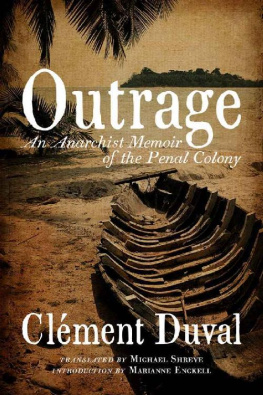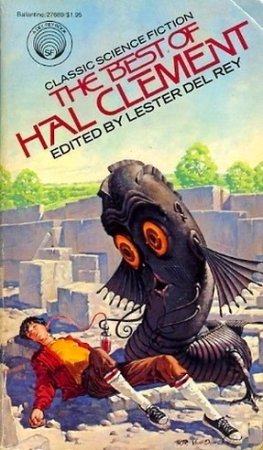Clement Duval - Outrage: An Anarchist Memoir of the Penal Colony
Here you can read online Clement Duval - Outrage: An Anarchist Memoir of the Penal Colony full text of the book (entire story) in english for free. Download pdf and epub, get meaning, cover and reviews about this ebook. year: 2012, publisher: Independent Publishers Group, genre: Detective and thriller. Description of the work, (preface) as well as reviews are available. Best literature library LitArk.com created for fans of good reading and offers a wide selection of genres:
Romance novel
Science fiction
Adventure
Detective
Science
History
Home and family
Prose
Art
Politics
Computer
Non-fiction
Religion
Business
Children
Humor
Choose a favorite category and find really read worthwhile books. Enjoy immersion in the world of imagination, feel the emotions of the characters or learn something new for yourself, make an fascinating discovery.
- Book:Outrage: An Anarchist Memoir of the Penal Colony
- Author:
- Publisher:Independent Publishers Group
- Genre:
- Year:2012
- Rating:3 / 5
- Favourites:Add to favourites
- Your mark:
- 60
- 1
- 2
- 3
- 4
- 5
Outrage: An Anarchist Memoir of the Penal Colony: summary, description and annotation
We offer to read an annotation, description, summary or preface (depends on what the author of the book "Outrage: An Anarchist Memoir of the Penal Colony" wrote himself). If you haven't found the necessary information about the book — write in the comments, we will try to find it.
Outrage: An Anarchist Memoir of the Penal Colony — read online for free the complete book (whole text) full work
Below is the text of the book, divided by pages. System saving the place of the last page read, allows you to conveniently read the book "Outrage: An Anarchist Memoir of the Penal Colony" online for free, without having to search again every time where you left off. Put a bookmark, and you can go to the page where you finished reading at any time.
Font size:
Interval:
Bookmark:


Outrage: An Anarchist Memoir of the Penal Colony
Michael Shreve 2012
This edition 2012 PM Press
All rights reserved. No part of this book may be transmitted by any means without permission in writing from the publisher.
ISBN: 978-1-60486-500-4 LCCN: 2011939693
PM Press
P.O. Box 23912
Oakland, CA 94623
pmpress.org
10 9 8 7 6 5 4 3 2 1
Cover by John Yates
Layout by Jonathan Rowland
This book has been made possible in part by a generous donation from the Anarchist Archives Project.
Printed on recycled paper by the Employee Owners of Thomson-Shore in Dexter, Michigan. www.thomsonshore.com
T he last Frenchmen who had been sentenced to the penal colony in Guiana were not repatriated until 1954, a century after the Second Empire had adopted the Loi sur lexcution de la peine des travaux forcs (Law on the execution of the sentence of hard labor). Starting in 1852 more than seventy thousand men were sent to Guiana: at least three fourths died there; barely five thousand made it back to France freed; nine thousand escapedthere were very few survivors.
Clment Duval was one of them. Condemned in 1887 to hard labor for life, he managed to leave lenfer vert (the green hell) after fourteen years and eighteen escape attempts. In his Memoir he tells about this hope that was stronger than everything he had to put up with: hunger, sickness, the constant humiliations inflicted on the convicts.
Duval was not a hero, nor was he a victim of a miscarriage of justice: he was an anarchist who admitted his crimesbreaking and entering, burglary, wounding a police officerand bore his sentence. But he continuously protested against the abuses, arbitrary punishments, guards contempt, snitching, cheating, and blatant injustices against the weakest or most rebellious.
Many anarchists ended up in the penal colonies after the lois sclrates (villainous laws) of 1892 allowed convictions for crimes of opinion or inciting violence. In France, from 1892 to 1894, Ravachol, Vaillant, mile Henry, and Caserio paid for their crimes with their heads. Accomplices, a few imitators, and comrades with ideas judged to be particularly dangerous were sent to Guiana. They had put up posters or insulted a police officer, they sang subversive songs or bragged about living without working The English sent boys suspected of stealing a handkerchief to mysterious Australia.
Off the shores of Cayenne, the administrative center of Guiana and a name emblematic of the penal colony, were the Salvation Islands: Devils Island, reserved for those convicted of high treason like Captain Dreyfus, Saint Joseph Island and Royal Island for the troublemakersthe recidivists, repeat offenders. The penal colony was not a mere matter of breaking rocks in a faraway land. It was a system that was highly refined in brutality, in wasting lives and money, in the maniacal control over the lives of convicts so that every minute was a punishment. They called it the dry guillotine.
The system quickly destroyed whoever was caught up in its gears, whether they were convicts or bureaucrats. Betrayal and shady deals dominated both sides. The hierarchical chain held the men as tightly as the shacklesit rotted their flesh and spirit. The promotion of convicts to the rank of foreman (contrematre) reinforced it: the foremen had to be the biggest toughs, the biggest snitches, and the biggest bootlickers because at the least offense they would be sent back among the crowd of convicts where their hopes of survival were slim.
See, when youre caught, its forever. Someone sentenced to eight years or more of hard labor had to double it, that is, stay in the colony for the same amount of time. He rarely survived, let alone earned enough money to finance a trip back to France. Most of the convicts (just like today) were young men. Some would live twenty, thirty, even fifty years dressed in shabby clothes, eating rancid bacon and rotten vegetablescrippled, sick, and powerless. A life of answering present twice a day at roll call, screaming your name and number at every passing of the guard, suffering the insults and humiliations in silence, stashing away whatever might bear witness to another life: a photograph, a letter with time in the hole for a trifle or a murder, for a bag of tobacco or a failed escape.
Clment Duval resisted. Born in 1850, he was older than most of his comrades. He was in the war of 1870 and had already known a hard life. But above all he was an anarchist and proud of it. A locksmith by trade, he refused to make handcuffs or sharpen the guillotine. When the director threatened to make him bend to his will, he answered that mindful men, such as I considered myself, were like glassthey might break, but they never bend.
When the big convoys of anarchists started arriving in Cayenne in 1892, Duval had already been there for five years. He had earned the respect of a few guards and the express animosity of others. He knew the possibilities of making stuff to earn a few extra sous or a little trust. He was aware of the risks of ill-prepared escape attempts. He knew who were the stubborn mules to watch out for. A dozen anarchists sentenced between 1892 and 1894 died from sickness or in revolt the same year they got there; a dozen died while trying to escape, or when too old to escape; four went back to France. Only two bore witness, Clment Duval and Auguste Liard-Courtois. If it werent for the publication of their memoirs, most of the others would have remained anonymous. (Short biographies are included in this book.)

Duvals Memoir began appearing in 1907 in the Italian anarchist weekly Cronaca Sovversiva in New York. Duval arrived in New York in 1903 and was taken care of by the Italian anarchist comrades, a large, united colony. Luigi Galleani, who had personally known the penal colony in the Italian islands, welcomed him in his home and started working on a translation of his manuscriptreally, an interpretation: he did not hesitate to rewrite entire dialogues and descriptions in order to enhance the text and create a thousand-page tome that was published in 1929 by the Biblioteca dellAdunata dei Refrattari.
Luigi Galleani died in 1931 in Italy, Clment Duval in 1935 in Brooklyn at the age of eighty-five. The children of the Italian anarchists gradually integrated into American society and LAdunata dei refrattari, one of their principal newspapers, shut down in 1971. The last editor, Max Sartin, was the one who left me Clment Duvals manuscript in 1980.
Max was a worthy heir of the illegalists. He lived under a false name, had his mail sent to neighbors (who offered me a plate of homemade tortellini and California wine as good as any Italian wine) and it was not until our second meeting that he let me in his house in Brooklyn to give me a glimpse of his archives. And, in the end, to give me a thick envelope marked CD.
His companion Fiorina and he led me to the subway with strong advice, and I did not dare open the envelope before being in a safe place. There were more than four hundred pages of manuscript there and a large photo of Duval. I did not know at the time that he had spent his final years with them. But I did know that since Galleani, no one had looked at those pages and no extract had been published in French.
Next pageFont size:
Interval:
Bookmark:
Similar books «Outrage: An Anarchist Memoir of the Penal Colony»
Look at similar books to Outrage: An Anarchist Memoir of the Penal Colony. We have selected literature similar in name and meaning in the hope of providing readers with more options to find new, interesting, not yet read works.
Discussion, reviews of the book Outrage: An Anarchist Memoir of the Penal Colony and just readers' own opinions. Leave your comments, write what you think about the work, its meaning or the main characters. Specify what exactly you liked and what you didn't like, and why you think so.













